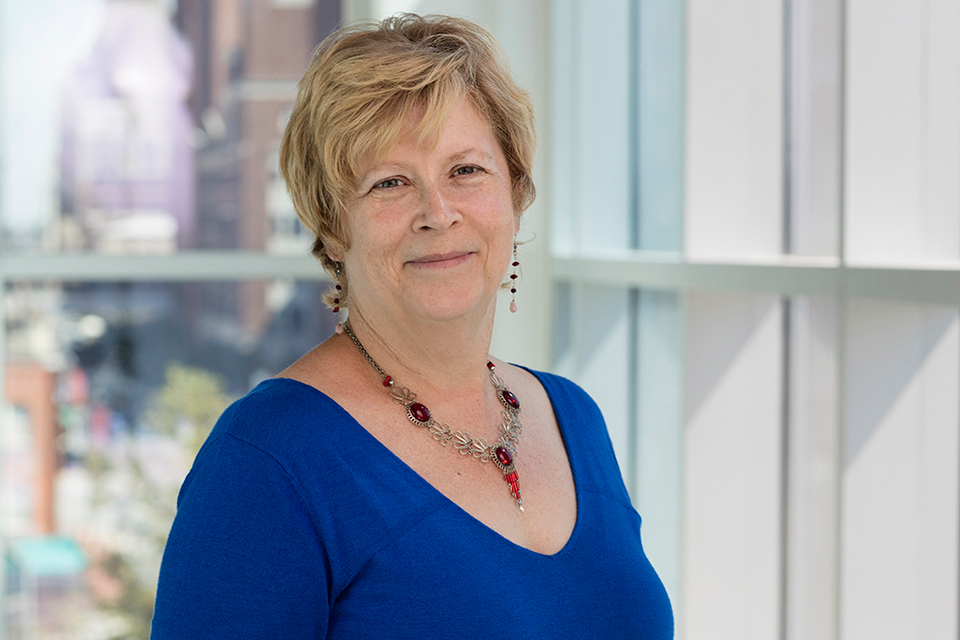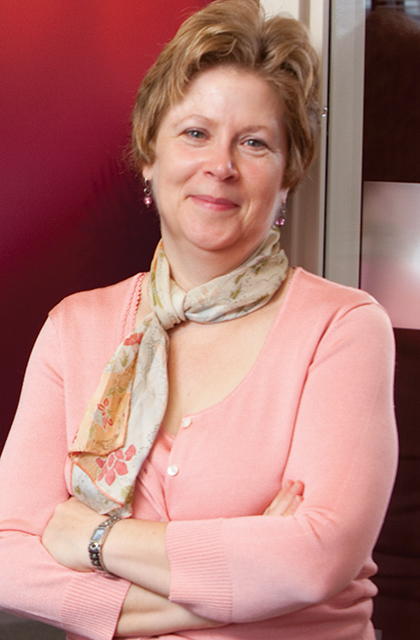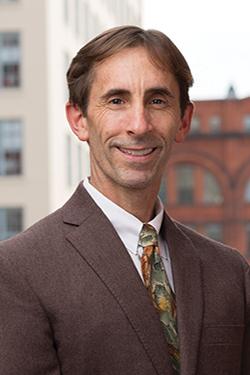Simoni-Wastila Named 2016 Founders Week Researcher of the Year
Linda Simoni-Wastila, BSPharm, MSPH, PhD, professor and Parke-Davis Chair in Geriatric Pharmacotherapy, recognized for her research on drug abuse and mental health in vulnerable populations.

By Chris Zang
October 12, 2016
She remembered: data points are people.
It’s an epitaph that Linda Simoni-Wastila, professor and vice chair of the Department of Pharmaceutical Health Services Research in the School of Pharmacy (SOP), thinks would be fitting for her research career.
For in her 48 research projects, including 31 as principal investigator, that have generated millions of dollars in funding, she never loses sight of the people behind the numbers.
It’s a lesson she learned at the University of North Carolina. “While in pharmacy school I was lucky to do a stint as a CO-STEP intern in the U.S. Public Health Service. Those four months changed my life,” Simoni-Wastila recalls. “I rotated through the prison system, U.S. Coast Guard, NIH, and Indian Health Services. I learned about public health, and realized I wanted to work with populations rather than individuals.”
That experience also whet her appetite about the role of medications in our health and social systems. “That curiosity remains, and is the driving force behind all the questions I ask,” she says. “That’s the broad brushstroke that defines what I do — how we deal with medicines, and how they impact our health, quality of life, and society.”
Joining the SOP faculty in 2001, Simoni-Wastila has carved out a niche in the rapidly expanding area of health policy research. Her work focuses on drug abuse and mental health in vulnerable populations — the young, the elderly, racial and ethnic minorities, and those at risk due to impaired physical and mental health. Her findings have helped shape state and federal policy surrounding prescription drug issues, and medication quality in long-term care and in mental health.
Simoni-Wastila is quick to credit her team of students, postdocs, staff, and faculty. Colleagues say she represents the epitome of collaboration.
“Almost every medical university talks about its commitment to interdisciplinary work, yet few researchers embody the spirit of such collaboration as Linda does with her peers,” says Gordon S. Smith, MB, ChB, MPH, professor in the School of Medicine’s Department of Epidemiology and Public Health, who has worked with her on research projects and dissertation committees.
She reaches out to colleagues beyond the University of Maryland, Baltimore (UMB) as well, having served as one of the few clinicians working within the Heller Institute at Brandeis, along with collaborators at the University of Massachusetts and Harvard. Currently, she works closely with colleagues at the Behavioral Health Administration in the Maryland Department of Health and Mental Hygiene in defining and preventing substance use disorders in the state.
“You simply cannot do research on your own. At least not good research,” Simoni-Wastila says. “I am quite limited in my capacity as a researcher. I surround myself with the smartest methodologists, research design experts, and clinicians I can find. My strength is in framing the problem and asking the questions. I rely on my stupendous colleagues, folks like Gordon Smith, with his expertise in TBI [traumatic brain injury] and alcohol-related crashes, to guide and design our studies, and to interpret their findings.”
Smith also cites the “cadre of researchers” Simoni-Wastila has trained and continues to mentor and Constance M. Horgan, ScD, professor and director, Schneider Institutes for Health Policy at Brandeis University, says she is proud to have served as Simoni-Wastila’s mentor and now colleague, working to “reduce the epidemic of prescription drug abuse and overdose.”
Simoni-Wastila, who says the School of Pharmacy has been most supportive of her research and recalls co-workers “were incredible” when her father was diagnosed with stage 4 head cancer, says mentoring is a small way of giving back.
“I’ve been blessed to work with tremendous colleagues, several of whom have served as inspirational mentors. I like to think I pay it forward with my students, trainees, and junior colleagues.”
She also does this by being active with many professional associations. Simoni-Wastila served three terms on the Commission on Prescription Drug Abuse and Diversion for the National Center on Addiction and Substance Abuse. For over five years, she has served as the director of the Statewide Epidemiology Outcomes Workgroup, a collaborative with the Maryland Department of Health and Mental Hygiene.
But ask her about her packed schedule and you find out there’s more. “You should know I make a mean apricot-pistachio white chocolate biscotti,” she confides with a smile.
And she’s an author — and not just the 100-plus research papers she’s had published. She enjoys writing fiction and short poems, has completed two novels, and earned a master’s in writing from Johns Hopkins University in 2015. Don’t call it a hobby though.
“Hobbies don’t make you wake up every day at 5:30 to get that hour in. I take writing quite seriously and expend time and money and effort in bettering my craft. I tend to write dark, edgy stuff about, well, the perils of academia. I write what I research, which, of course, is what ‘I know.'”
On Nov. 5, she may have a new topic when she receives her Researcher of the Year Award at UMB’s Founders Week Gala. The black-tie setting seems only fitting in that Simoni-Wastila says the award makes her feel “like a movie star!”
“Researcher of the Year is a tremendous honor, and one that humbles me because my work is so much fun,” she says. “It’s also humbling because I don’t think of myself as a researcher so much as a teacher. If I wanted to do straight research, I’d likely work in the industry or NIH. But projects like the ones I conduct are best done in teams of people. We tend to share a common vision about how to shed light on how to make life better for folks who are the focus of our research.”


